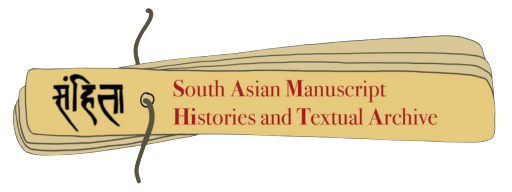Manuscripts
Search Filter
Jagadīśaśataka
112732_M001A_4050_CS Language : Sanskrit Scripts : Devanagari
A hundred verses on Lord Kṛṣna, composed in the 13th century by Raghurājasiṃharāju. His patron's name was Krshnacandra Raja Bahadur. The identity of this king is doubtful.
Nāḍīparīkṣā
112735_M002A_4051_CS Language : Sanskrit Scripts : Devanagari
A collection of three different works on nāḍīparīkṣā (pulse reading), presented as three chapters. At the end, it says, iti nāḍīparīkṣāsarvasaṃgraha.The authorship is ascribed to Rāvaṇa, adversary of Rāma in the Rāmāyaṇa.
Laghuśabdenduśekhara
112738_M004A_4052_CS Language : Sanskrit Scripts : Devanagari
A widely-used Sanskrit grammar by Nāgojibhaṭṭa (active 1700 c.–1750 c). He belonged to a Marathi Brahmin family, and is known for his prolific writings on Sanskrit grammar. This manuscript contains only one chapter out of 16, Strīpratyaya.
Lakṣmīstotra
112739_M005A_4053_CS Language : Sanskrit Scripts : Devanagari
This text represents a small section of the Viṣṇu Purāṇa, which invokes devi Lakṣmī. It is written in the form of a dialogue, as common in Puranic literature.
Harivaṃśamāhātmya
112740_M006A_4054_CS Language : Sanskrit Scripts : Devanagari
This text may derive from a Puranic work. Its authorship is ascribed to sage Kṛṣṇadvaipāyana.
Ācārādarśapaddhatiarpaṇa
112742_M007A_4055_CS Language : Sanskrit Scripts : Devanagari
A work on Dharmaśāstra of which only a few copies are extant.
Gītagovinda
112743_M008A_4056_CS Language : Sanskrit Scripts : Devanagari
The poem by Jayadeva (12th century CE) with the Rasamañjarī commentary of Śaṅkara Miśra. It contains five out of 12 sargas (cantos) of the Gītagovinda; the fifth ends with the seventh śloka of the second prabandha (song).
Gītagovinda
112744_M009A_4057_CS Language : Sanskrit Scripts : Devanagari
The poem by Jayadeva (12th century CE) with Padadyotikā or Padadyotinī /Padadyotanikā/ Pradyotanikā commentary of Nārāyaṇa Bhaṭṭa or Paṇḍita. Contains two out of 24 prabhandhas (songs).
Holikākathā
112749_M012A_4058_CS Language : Sanskrit Scripts : Devanagari
This text describes Holikākathā, which persist in folklores in the different parts of India. At the end it invokes demon goddess Ḍhuṇḍha. It belives that Ḍhuṇḍha slained by Śiva. During her death she got a boon from Śiva and honored being worshiped every year at the full moon of Phālguna. This particular day celebrated in South Asia as Holi festival. This text claimed, that it is derived from Skanda Purāṇa.
Amarakośa
112750_M015A_4060_CS Language : Sanskrit Scripts : Devanagari
A work of lexicography by Amarasiṁha (active 500 c.), containing synonyms for different categories of words. It is divided into three kāṇḍas, svargādikāṇḍa, bhuvargādikāṇḍa and sāmānyādikāṇḍa. The manuscript contains only the second and third, along with the Amaraviveka commentary by Maheśvara.
Sūryaśataka
112751_M016A_4061_CS Language : Sanskrit Scripts : Devanagari
A poem in praise of the sun god, written by Mayūra (580 c.–650 c.), with a commentary named Sārtha by Bālambhaṭṭa. Mayūra was a contemporary of King Harṣa and Bāṇabhaṭṭa. Recitation of this prayer is supposed to cure leprosy. This is an incomplete manuscript with ten folia: 4 (verses 1–2), 8-9 (23 –35), 13–15 (56 –71), 19–21 (90–100). Original text has 101 verses while this text has 100 verses and extra 2 verses (numbered as 1 and 2) at the last. The first one marginally different from the original work (verse 101). The second verse perhaps written by the commentator, praising Sūrya to get rid of all the sin which causes leprosy.
Sārasvatavyākaraṇaṭīkā
112752_M017A_4062_CS Language : Sanskrit Scripts : Devanagari
This appears to be a commentary on Sārasvatīprakriyā of Anubhūti Svarūpācārya (1270 c.), authored by Puñjarāja, who was a minister at the court of Sultan Giasuddin Khilji, his patron (r. 1469–1500). Puñjarāja belonged to the Śrīmāla family of Malabar. It seems that his ancestors or Puñjarāja himself migrated from Malabar to Mālva.













